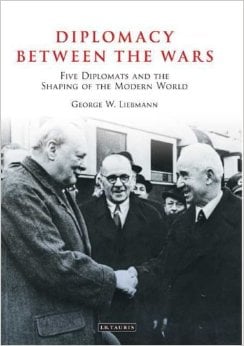The first two sentences of this fine book tell it all. “This is a text for our times. It is a celebration of diplomacy and diplomats—of an essentially extinct profession.” I shall return to this summa summarum; but first, here is my account of the contents of this book.
It consists of five substantial portraits of men who, during the first half of the last century, represented their nations and incarnated at least some of their best qualities. They are Lewis Einstein (an American), Horace Rumbold (an Englishman), Count Johann Bernstorff (a German), Count Carlo Sforza (an Italian), and Ismet Inönü (a Turk). I agree with Liebmann’s high estimation of all these men, except perhaps of Sforza, for whom Lieb-mann’s regard is greater than mine. An especially good portrait is that of Einstein, an active diplomatist only part time (and no relation to the much-celebrated physicist, Albert of the astral hair). Lewis Einstein was a gentleman and an amateur scholar, in the best senses of the term amateur. He had a profound knowledge of history and wrote at least one remarkable book, as well as many articles and essays. He was never close to the center of American statecraft, but Theodore Roosevelt appreciated his mind and character. He had a vision of Western civilization and of the providential role of the United States within it, a vision that has now become, alas, very rare.
Sir Horace Rumbold was Britain’s ambassador in Berlin during the end of the Weimar Republic and the first years of the Hitler regime. His assessment of that regime was first rate, prescient, and much superior to those of the two British ambassadors who followed him. Johann Bernstorff served as the German ambassador in Washington before Wilson’s declaration of war against Germany in 1917. He tried to avoid the latter event, but in vain. That failure need not diminish his merits—rather the contrary. The intelligence and the probity of Bernstorff’s mind were exemplary. He was condemned to struggle on two fronts, against the vapid idealism of Wilson and, even more, against the wooden militarism of Germany’s rulers during World War I. Bernstorff had his personal weaknesses, but these did not matter. He saw early the dangers of what Hitler represented and incarnated; he struggled against them in vain; he died in self-imposed exile, forlorn. Sforza was luckier: A prominent antifascist, he fought for a high position in Italy after the fall of Mussolini. Churchill distrusted him, not without reason. In the end Sforza got a position he wanted, but by then that did not matter much. Ismet Inönü became the president of Turkey after the death of the great Kemal in 1938. His statesmanship was of a high order. He was able to keep Turkey out of the war, withstanding the enormous weight of Germany and, after the war, of the Soviet Union. He also withstood the British pressure—eventually to the benefit of the Allies—to enter the war on the Allied side prematurely.
Allow me now to return to the very first sentence of this book. “This is a text for our time.” Indeed it is. Last fall, the incumbent U.S. secretary of defense, Robert Gates, told a London audience that, “For the first time in American history, both the Secretary of State and the Secretary of Defense have doctorates in International Relations, with their dissertations about Russia. A fat lot of good that gave us.” That is not an admission of humility. It is an expression of ignorance. It is indeed significant that the now-former secretary of state earned a degree in international relations—not in history—in Denver. The subject of her thesis was the Soviet intervention in Czechoslovakia in 1968 (a topic, perhaps, for a superficial article in Commentary or National Review), which had occurred but a few years before Dr. Rice began to process her words. After her appointment, Madame Secretary revealed at least one startling example of her ignorance: She did not know that the Truman Doctrine in 1947 included not only Greece but Turkey. Our other international scholar, the current secretary of defense, was serving as deputy director of the CIA in 1988, when he declared that the Berlin Wall would not disappear for a long time. It fell less than a year after this misbegotten prophecy.
Yes, as Liebmann puts it, classical diplomacy is now “an essentially extinct profession.” One of the many results of this extinction is the rise of experts in “international relations,” a dubious discipline that has produced such international celebrities as Rice and Gates and Brzezinski and Kissin-ger, all panjandrums of international relations, most of them woefully ignorant of history. I have said that Liebmann’s assessment of Carlo Sforza is the only one in this excellent volume about which I have some reservations, yet the chapter’s last paragraph is illuminating. In 1952 the young Henry Kissinger, then an undergraduate at Harvard, sent an article of his to Sforza, panting for the latter’s approval. Sforza, otherwise not very terse in his prose, answered in two sentences. “You are so kind as to ask my reaction to the basic approach of your review. I would dare to venture to suggest only this: less generalities and more factual data.” The elevation of Kissinger to the bridge of the American ship of state would eventually follow.
[Diplomacy Between the Wars, by George W. Liebmann (New York: I.B. Tauris) 269 pp., $85.00]

Leave a Reply